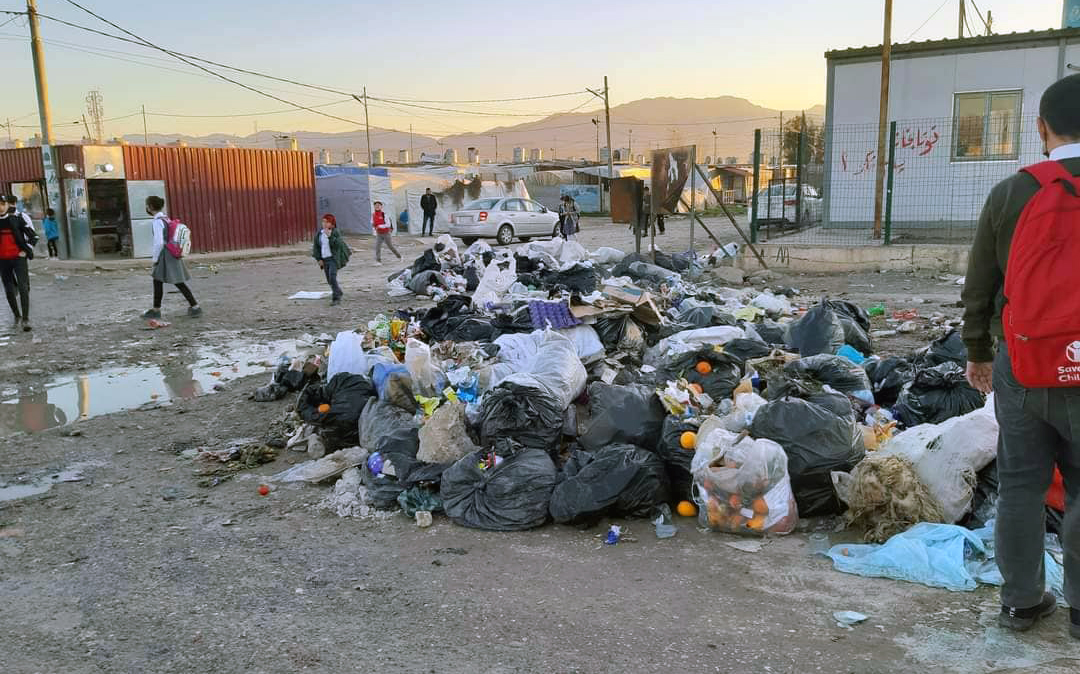The students and teachers of an IDP camp school ae complaining about piles of waste surrounding the school thrown by camp residents carelessly, hardening their life to see the unpleasant environment every day.
Cham Mishko camp school staff complain about the unpleasant odors emitted due to the accumulation of waste dumped by thousands of families residing the camp in the vicinity of the camp school, without any one being held accountable and put an end to the dour.
Cham Mishko School is administratively part of Shingal (Sinjar) Education - Department of Kurdish Studies – yet it is located in the middle of Cham Mishko camp for Internally Displaced People IDP in Zakho District of Dohuk province. The 51 teachers of the school tutor 1,267 students, from grade to nine.
The majority of the residents of Jim Mashko camp are from Shingal district, home to the Ezidi community, part of Nineveh province. More than 4,300 displaced families, over 21,000 people, reside in the camp, according to the official statistics of the Kurdistan Regional Government KRG.
In war-torn Shingal, there are two directorates of education: the Kurdish and the Arabic Education departments, the first funded by the KRG and the second by the federal government in Baghdad. The two directorates have more than 54,000 students, the majority of whom are still displaced in the camps and cities of the Kurdistan Region KRI.
According to KirkukNow follow-up, tons of waste surround the school, which, in addition to being a hotbed of disease outbreaks, distorts the landscape of the area.
Why we should breathe in this smell this everyday?
“We see these scenes when we go to school and come back home. I don’t feel like I’m in school, because the foul smell of garbage is spread in the classrooms and in the school yard,” said Qasim Khalaf, 12, a student of grade six.
Khalaf said he has to attend that school because he cannot commute daily to and from another school. He stressed that two years ago he had developed a skin allergy, blaming it to the garbage piled up near his school.
"Why we should breathe in this smell this everyday?"
Iraq’s education infrastructure is in ruins in many parts of the country; one in every two schools is damaged and needs rehabilitation, says a report by UNICEF about education in Iraq. The matter is worse in the disputed territories where insufficent budget left many schools without adequate teachers, others turning tents and cabins into faciliteis under the mercy of harsh cold winter and baking sun of summer.
Video: Accumulation of waste in the vicinity of Cham Mishko School causes inconvenience to students and teachers
Khidir Qasim Shammo, principal of the school, said most of the camp's IDPs get rid of their waste in the vicinity of the school. “We organized several cleaning campaigns with the participation of students, but to no avail. After each time, things return to their previous state."
The accumulation of waste also affected the educational process in the school, as "bad smells are spreading throughout the school amid fears that students will suffer from skin diseases,” Shammo concluded.
The principal has reported the problem to the camp administration and the concerned authorities several times yet no concrete actions taken, noting that some camp residents throw waste around the school using vehicles to transport it without being held accountable or punished.
KirkukNow contacted the administration of Cham Mishko camp for Ezidi IDPs, but they refused to make statements about the problem and only said that they would seek to solve the problem.
Local education officials blame the camp management for the waste accumulated at the vicinity of the school.
Maysir Haji, director of Shingal Kurdish Education Department of the declared they were not aware of the problem and recently were informed about it, indicating that this falls within the framework of the responsibilities of the camp administration, which is supposed to allocate landfills for throwing waste and tidy the school perimeter.
“We will send a letter to the camp administration soon, informing it of the need to address the problem,” said Haji.
About 12,000 teachers are schooling 32,600 students of Shingal’s Kurdish Education department.
In August 2014, the Islamic State in Iraq and Syria ISIS militants attacked the Ezidis (Yazidis) in Shingal and Nineveh Plains, killing more than a thousand Ezidis, including children. The extremist militants of ISIS abducted more than 6,000 civilians, nearly 2,000 children were rescued, and the fate of about 3,000 has not been determined yet.
There are more than 664,000 IDPs in the IKR, the majority residing 26 IDP camps, mainly Ezidis, in the northern province of Dohuk, Erbil, and Sulaymaniyah while the others live outside the camps.





